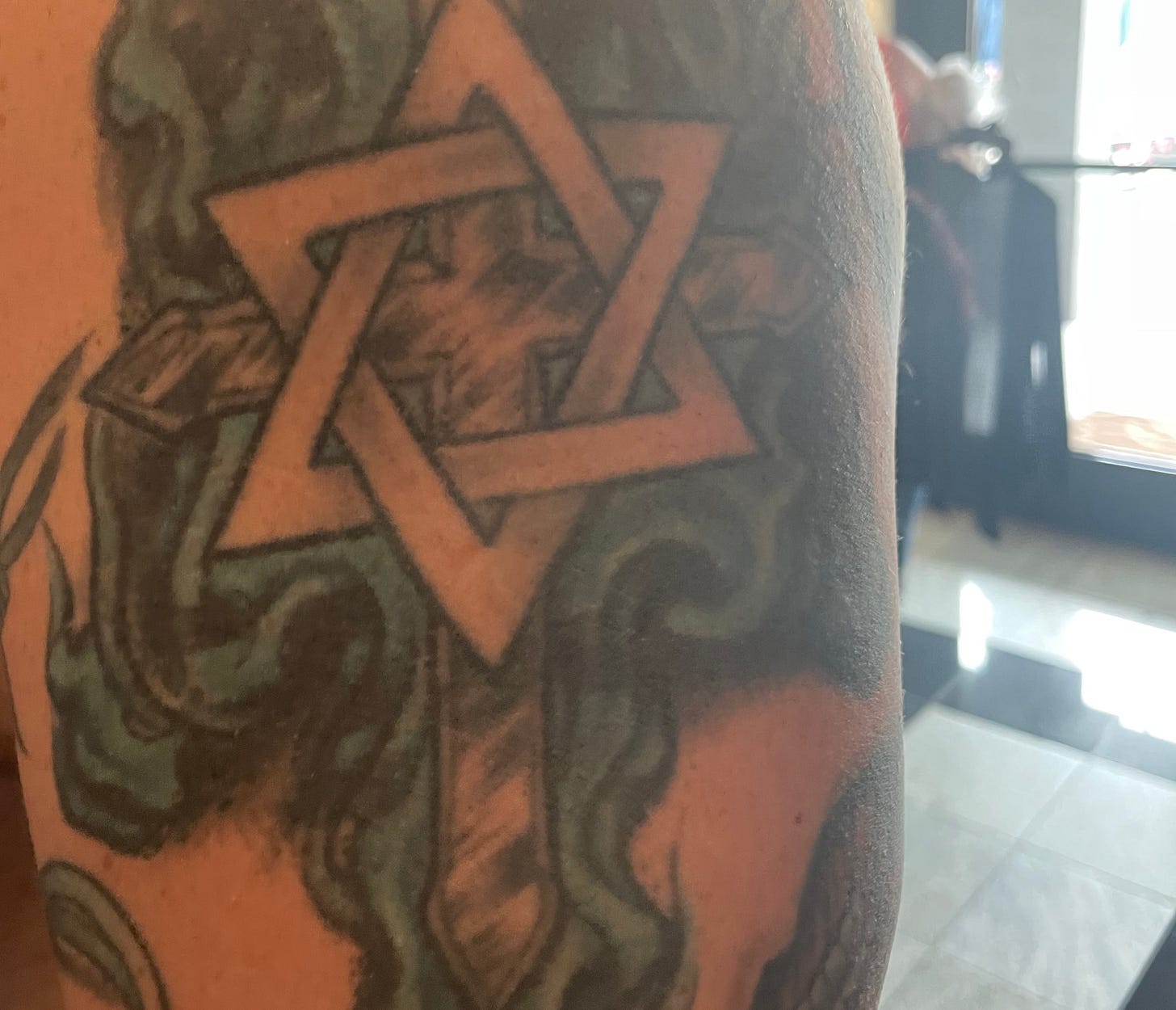Why are tattoos taboo for Jews? Like most things in Judaism, it has to do with death and slavery, and the exodus from Egypt. Probably.
\For context, here’s the specific mention in the Torah, the book of Vayikra (Leviticus) that prohibits tattoos: “You shall not make gashes in your flesh for the dead, or incise any marks on yourselves. I am [God].”
Here it is in Hebrew:
וְשֶׂ֣רֶט לָנֶ֗פֶשׁ לֹ֤א תִתְּנוּ֙ בִּבְשַׂרְכֶ֔ם וּכְתֹ֣בֶת קַֽעֲקַ֔ע לֹ֥א תִתְּנ֖וּ בָּכֶ֑ם אֲנִ֖י יְהֹוָֽה
There’s no reason given. Like so many Jewish laws, the justification for the prohibition comes down to, “Don’t do it, I am God,”
You’ll notice, though, that tattooing is mentioned in the context of a mourning ritual, suggesting that tattooing was, at least at the time the book of Leviticus was committed to paper (or papyrus), something that you did after a loved one died.
Not according to University of Texas at Austin researchers John Huehnergard and Harold Liebowitz who, in 2013, published a paper on “The Biblical Prohibition Against Tattooing.”
Huehnergard and Liebowitz examine in depth the mourning rituals of non-Jews in the ancient Middle East and conclude that, “none of the extra-Biblical sources identify tattooing as a mourning practice.”
So, despite the context, there’s no apparent connection between tattooing and mourning rituals, though they do note that “tattooing may represent a different, unattested pagan mourning practice — perhaps tattooing of the name of the deceased.”
It was, however, a thing you did to your slave in ancient Egypt:
“In Egypt, captives were branded with the name of a god, thus belonging to the priesthood, or of the pharaoh, thus belonging to the state. Hence, the tattoo in Egypt, as in Mesopotamia, was a mark of slavery.”
The same was true in Roman times, and for the ancient Mesopotamians (and for enslaved people in the United States, who were sometimes branded so their status as owned people could not be hidden).
Huehnergard and Liebowitz argue that as the exodus from Egypt plays such a “crucial role in Jewish theology and law,” the prohibition against tattooing is intended “to emphasize Israelite freedom from human masters.”
If tattooing was for ancient Jews “a symbol of servitude,” post-Egypt Jews should no longer serve any master but God, and practice only His accepted form of body modification — circumcision.
Fast forward a thousand years or so. Judaism is as much an oral tradition as a written history, and the Mishnah is where that oral tradition is collected, in the form of rabbinic arguments and interpretations.
One source argues that neither the tattooist or the tattooee “is not culpable” unless he gets tattooed “for the purpose of idolatry.”
Maimonides, known as the Rambam, wrote that a tattoo is acceptable as long as it does not bear the name of a foreign god.
Huehnergard and Liebowitz conclude that the original reason for the prohibition against tattooing was not to differentiate the Jewish mourning ritual but to signify the end of servitude. Later, the reason morphed into idolatry.
I might argue that both reasons are the same: Differentiation. Circumcision is an acceptable, necessary form of body modification, and while not uniquely a Jewish tradition it is very central to Jewish law and practice, differentiating Jews from their non-Jewish neighbors. No other form of body modification is acceptable.
One may not “make gashes in your flesh” or “incise any marks on yourselves” because that is what non-Jews do, be they in mourning or enslaved or pagan idolators or not.
Hey there. This newsletter, examining the intersection between seemingly opposing cultures — tattoos and Jews — is sent out weekly and for free, at least for now. If you found this interesting or amusing, would you mind sharing it with someone else? I’d be forever grateful. Thanks a mil — Jordan




